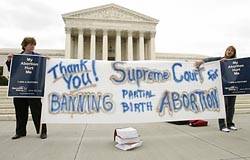The Unspeakable Becomes Illegal
The Supreme Court’s decision in Gonzales v. Carhart marked the first legal prohibition on abortion since Roe v. Wade — a small but significant victory in what Pope John Paul II called the greatest civil rights issue of our day.
The court’s decision was lengthy. The hue and cry from abortion apologists promises never to end. But the ruling is simple and clear: The right to abortion does not include a right to abort a partially-born child. Period.
The decade-long effort to stop partial-birth abortion was bipartisan and democratic. More than 70% of Americans wanted to ban it, including those who identify as “pro-choice.” Catholics played an important part in the process, sending more than 40 million postcards to Congress calling for an end to this violent practice. Perhaps it is no coincidence that 40 million is the number of children who have lost their lives, and their voices, to legal abortion.
I debated former NARAL President Kate Michelman on National Public Radio the morning after the ruling. On the way there, I was told that Dr. Leroy Carhart, lead plaintiff and partial-birth abortion practitioner, would be joining the debate by phone. I protested the imbalance, but he came on anyway and was angry that anyone should tell him what he can and can’t do.
He also claimed to have only done the procedure once in the last 10 years, and then only to save the life of the mother. If that were true, it is irrelevant, because such conduct would be permitted under the law’s exception for life-threatening circumstances.
But Carhart’s own previous testimony shows it not to be true. Los Angeles Times reporter David Savage who was also on the program said off the air that Carhart had previously claimed to have done the procedure many more times.
I was given the first chance to speak after he finished, and my response was: “Here is a man who pulls living babies feet first out of the bodies of their mothers and stabs them in the head.” Res ipsa loquitur — the thing speaks for itself.
Michelman tried to change the subject to contraception, a favorite non-sequitur of the “pro-choice” crowd. She sounded the familiar notes about a right to decide whether and when to become a parent and back-alley abortions. But, in context, I have to think her well-rehearsed platitudes sounded off key.
The issue in this case isn’t whether any abortion should ever be legal, it is whether every abortion must always be legal.
Americans have never favored
unlimited abortion under the law, yet as long as Roe v. Wade
is the law of the land that is precisely what Americans are forced to accept.
This case, at last, establishes at least one modest limitation: that the right
to abortion does not extend beyond the womb. It also acknowledges that women
suffer after abortion. It brings American law on abortion one step closer to
Americans’ views on abortion.
One caller asked her whether banning this procedure wasn’t rather arbitrary, given that all late-term abortions can be said to be gruesome. This put Michelman in the uncomfortable position of agreeing with him, and explaining that, in fact, a dismemberment abortion is even more disturbing than a partial-birth abortion because, as she said, the “fetus is literally torn apart.”
Here, I thought, is why we fought so hard for this law: because it forced abortion supporters out from behind the word “choice.”
At trial, abortion doctors were forced to admit that babies are alive during partial-birth abortion; that their hearts are beating. Doctors were forced to admit that they’ve watched babies’ hands and legs move outside of the womb before crushing their heads.
There’s trial testimony that partial-birth abortion is extremely painful for the child, that women are not told the facts about partial-birth abortion before it’s done on them, and that this violent act is never medically necessary according to qualified medical experts.
After World War II, when the full horrors of the Holocaust of the Jews began to become known to the public, there was a great outcry: “We didn’t know! If only we had known!” The trial transcripts on partial-birth abortion are the permanent public record of the modern-day holocaust of abortion. No one will be able to say they didn’t know.
The host of the NPR program asked me whether the new law will actually mean fewer abortions, since it does not outlaw other late-term abortion methods. Some in the pro-life movement have asked this question too. The fight to stop partial-birth abortion has unmasked “choice” and brought the brutal reality of abortion to the forefront of public debate, and because of this many lives have already been saved.
But the ruling also plants an important pro-woman, pro-life premise in the law in its discussion of the negative impact that all abortion poses to women. After 34 years, we’ve turned a corner in the debate on abortion, and won a victory for women, for children, for the integrity of the medical profession and for the rule of law.
Cathy Ruse is a senior fellow of legal studies at the Family Research Council.
- Keywords:
- May 06-12, 2007














